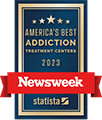Understanding Cocaine Addiction
Learn About Cocaine Abuse & Addiction
Cocaine is a potent and highly powerful substance that is abused by many. This stimulant, which is also known as coke, is often consumed because it brings on intense feelings of invincibility and happiness. It can also increase one’s self-esteem, enhance perception, and bring on a sense of grandiosity. Cocaine can be smoked, injected, or snorted, but the high that comes with it is short and lasts less than 30 minutes in most cases. This drug can cause pleasurable sensations, however they only last for a short period of time, making individuals more likely to use more and more of it to keep their high going. As the dosage increases, or when the frequency in which individuals are using this substance increases, changes within the brain start occurring. These changes can then lead to tolerance, dependence, and addiction. Sadly, once an individual has become addicted to cocaine, it can be incredibly hard for him or her to stop using without professional help.
Statistics
Statistics of Cocaine Abuse
According to the American Psychiatric Association (APA), 0.3 percent of those aged 18 and older struggle with cocaine use disorder. Additionally, the National Drug Control Policy states that roughly 3.6 million individuals use cocaine regularly within the country.
Causes & Risk Factors
Causes & Risk Factors of Cocaine Abuse
There are a variety of causes and risk factors linked to an individual’s vulnerability to developing a cocaine use disorder, including:
Environmental: The APA states that there are a number of ways in which an individual’s environment can influence the onset of cocaine abuse. For instance, being exposed to cocaine prenatally, witnessing community violence, having parents who abuse this substance, and living within a home that is unstable can all add to the likelihood of experimenting with and abusing cocaine.
Risk Factors:
- Ease of access with which one can obtain cocaine
- Possessing an impulsive personality or other similar traits
- Being surrounded by individuals who abuse cocaine or other drugs
- Having a history of childhood conduct disorder
- Suffering from schizophrenia, bipolar disorder, or antisocial personality disorder
Signs & Symptoms
Signs & Symptoms of Cocaine Abuse
The signs and symptoms that an individual might display when he or she is abusing cocaine can vary from individual to individual. However, the following are some examples of signs and symptoms that may be observable by others and infer a person is abusing this dangerous drug:
Behavioral Symptoms:
- Rapid speech
- Hypervigilance
- Participating in dangerous or high-risk activities to obtain cocaine
- Abusing cocaine in increasingly larger amounts over longer periods of time than originally planned
- Failing to take care of responsibilities at home
- Continuing to abuse cocaine despite the desire to quit
- Jumping from topic to topic while in conversation
- Engaging in repetitive movements
- Failing to fulfill obligations at work
- Acting out of character in social settings
Physical symptoms:
- Muscular weakness
- Dilated pupils
- Decreased appetite
- Weight loss
- Vomiting
- Nausea
- Increased body temperature
- Rapid heartbeat
- Chest pain
- Elevated or lowered blood pressure
- Seizures
Cognitive symptoms:
- Confusion
- Experiencing intense cravings for cocaine
- Impaired judgment
- Paranoia
- Euphoria
Psychosocial symptoms:
- Anxiety
- Experiencing episodes of unwarranted anger
- Heightened states of irritability and agitation
- Lacking emotional reactivity
Effects
Effects of Cocaine Abuse
When individuals continue to abuse cocaine, they put themselves at risk for serious consequences. All areas of their lives can become negatively affected when the abuse of cocaine is continued. Some of the ways that cocaine can impact an individual’s life can include:
- Financial turmoil
- Loss of one’s sense of smell
- Failing to attend to one’s occupational responsibilities, potentially resulting in job loss
- Malnutrition
- Interaction with law enforcement
- Damaging one’s kidney, liver, or lungs
- Loss of child custody
- Damage to the cardiovascular system
- Familial conflict
- Marital strife or divorce
- Cardiac arrest
- Cognitive impairment
Co-Occurring Disorders
Cocaine Abuse & Co-Occurring Disorders
Unfortunately, it is common for individuals with cocaine use disorder to also battle symptoms of other mental health conditions. Some of these co-occurring conditions can include:
- Other substance use disorders
- Gambling disorder
- Attention-deficit/hyperactivity disorder (ADHD)
- Posttraumatic stress disorder (PTSD)
- Bipolar disorder
- Schizophrenia
- Antisocial personality disorder
- Conduct disorder
Effects of Withdrawal & Overdose
Effects of Withdrawal & Overdose from Cocaine
Effects of cocaine withdrawal: When an individual abuses cocaine and then tries to stop or curb how much he or she is consuming, withdrawal will occur. The symptoms of cocaine withdrawal can be painful and can show up within a few hours after one’s last use. Some of the possible symptoms and effects that might occur during cocaine withdrawal can include:
- Fatigue
- Increased appetite
- Extremely strong cravings for cocaine
- Weight gain
- Disturbed occupational functioning
- Insomnia or hypersomnia
- Vivid, unpleasant dreams
- Dysphoric mood
- Disturbed social functioning
- Psychomotor agitation
- Psychomotor retardation
Effects of cocaine overdose: When individuals abuse cocaine, they are putting themselves at risk for experiencing an overdose. An overdose happens when an individual consumes more of a substance than his or her body is able to handle. Since cocaine is so potent, and because it is able to cross the blood-brain barrier so quickly, people can easily consume more than their bodies can metabolize without even knowing it. If someone overdoses on cocaine, it should be treated as a medical emergency, and treatment should be obtained immediately. Some of the signs that can signal that someone is having a cocaine overdose include:
- Heart palpitations
- Flushing of the skin
- Cramping
- Vomiting
- Chest pains
- Cardiac arrest
- Excessive sweating
- Hypertension
- Stroke
- Seizures
- Panicked feelings
- Irregular breathing













